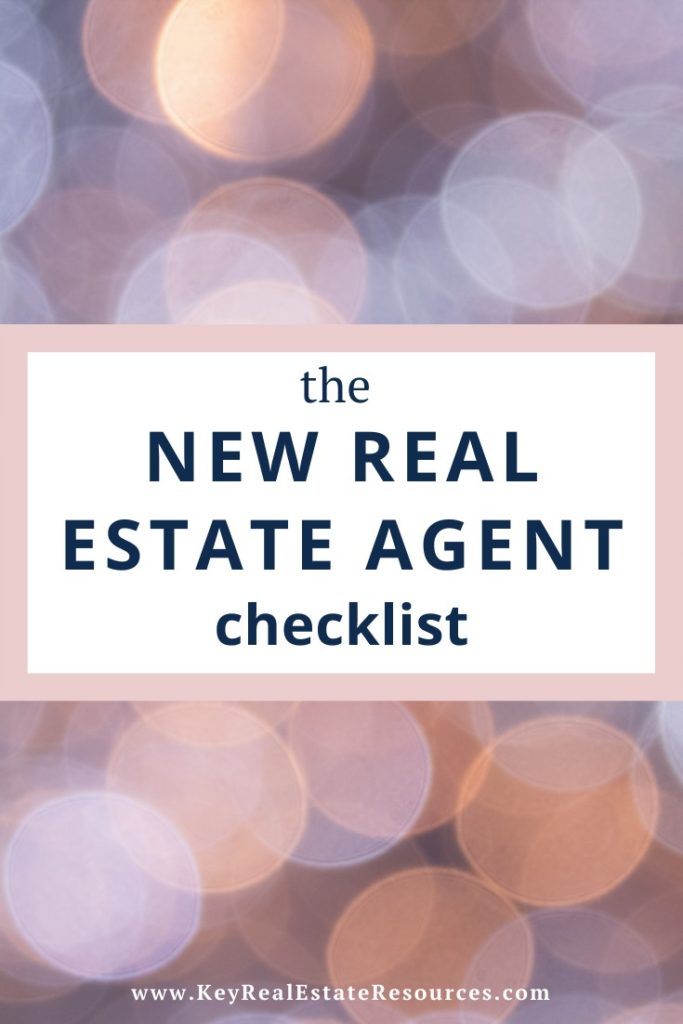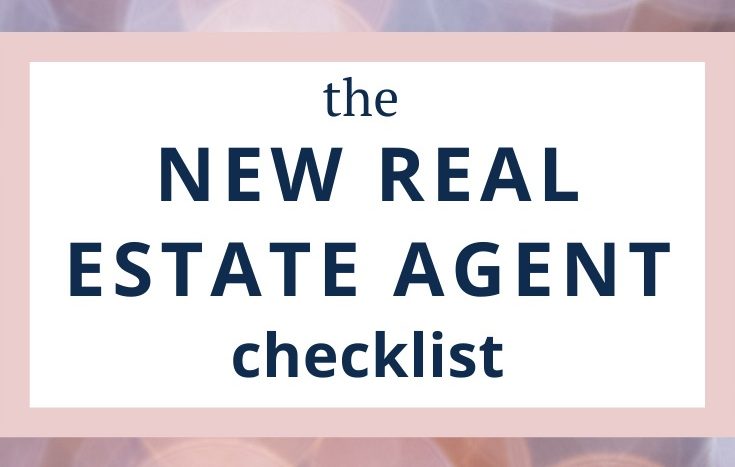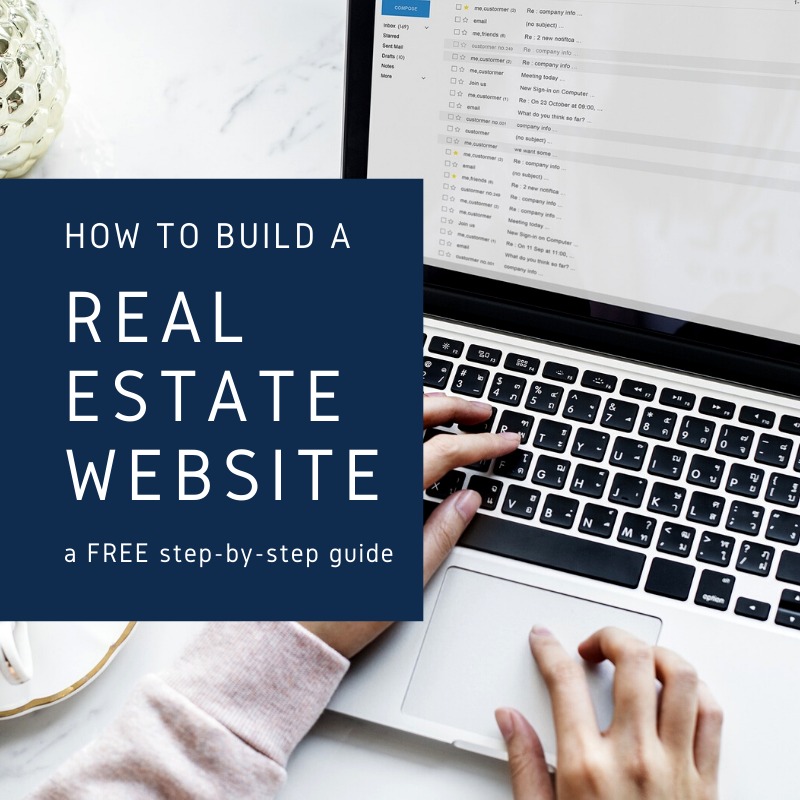Our New Real Estate Agent checklist is a quick and simple list of to-dos to help you launch your new career successfully.
Whether you’re just beginning to consider real estate, or you just got licensed, you won’t miss a beat with this checklist.
The New Real Estate Agent Checklist
Let’s break down our new real estate agent checklist into phases:
- Pre-license
- On Day One
- Within the First Month
- Within the First Quarter
By the end of the first quarter, your new real estate agent checklist should be complete, and you’ll be able to operate business-as-usual from that point forward!
Quick note: this article was first published in 2021. Here is the new and improved version.

Pre-License Real Estate Agent Checklist
Here’s a list of things you’ll want to complete even before getting your real estate license.
1. Enroll in your state-required real estate courses.
Your real estate education is Step 1 in becoming a real estate agent. My recommendation for the best real estate school is AceableAgent. AceableAgent has among the highest exam pass rates of any real estate school in the country, probably because test-prep is included in your coursework. And their courses are all designed so you can study from your phone or tablet whenever you have a few spare minutes to squeeze in a lesson. Oh, and they’re super affordable.
If AceableAgent isn’t yet available in your state, Real Estate Express is another excellent option.
2. Pass your real estate exam.
After your coursework is completed, you’ll be ready to take your state exam. We have several tips for passing your exam on the first try, but you should know that many people need more than one attempt to pass. So don’t stress yourself out too much about the exam.
3. Choose a broker.
In most states, you’re required to have a licensed real estate broker to oversee your work. Too many new agents make the mistake of choosing the broker that offers the best commission split. But there’s a lot more to consider. Things like:
- What kind of training does this brokerage offer?
- Will this broker provide leads?
- Can I use this broker’s reputation to give myself credibility as a new agent?
- What additional costs are incurred with this broker?
- What additional services are provided by this broker?
- Will this broker pay for advertising?
Many new agents are better off choosing a brokerage that offers training opportunities over brokerages that offer a high commission split without training.
4. Create a business plan.
So many new agents skip this step because they simply don’t know how to write a business plan. And writing a business plan sounds like a major undertaking, especially with the time and effort you’re putting into your real estate courses and studying for your exam.
But consider this: would you be confident investing in a new business if it didn’t have a business plan to detail its marketing, finances, and operations?
Launching a real estate career is effectively starting a new business, and your new business deserves a solid plan.
If you’re new to business planning, we have a post that details every step of writing a business plan. You can even get a business plan template online to remove all guesswork from the planning process.
5. Get your profile photos taken.
You’ll need headshots to serve as profile photos for all your social media accounts, your website, and your profiles on real estate syndication websites. While it’s tempting to DIY your profile photos, hiring a photographer is typically a solid investment. Professional headshots boost your credibility and give your brand a polished look.
6. Write your bio.
Writing a bio is one of the most weirdly difficult tasks on your new real estate agent checklist. It sounds easy, but when you sit down to write, most agents struggle to hit the right tone. Check out How to Write a Killer Real Estate Bio for a template that helps you sell yourself to prospective clients.
On Day One
Day One of your new career can be a bit anticlimactic. After weeks or months invested in getting your real estate license, your first day ends up being dedicated to administrative tasks like setting up email and voicemail. But these items need to be completed before you can start contacting clients, so power through.
1. Set up your new email.
Don’t forget the signature block with your contact info.
2. Set up your new voicemail.
Don’t overthink this. Here’s a simple outgoing message script:
Hi, you’ve reached Michelle Clardie of Key Real Estate. I’m currently assisting other buyers and sellers, but if you leave a message with your name, number, and a brief description of how I can serve you, I’ll return your call just as soon as I’m able. Thank you.
3. Add your profile information to your broker’s website.
Your broker will tell you how to add your bio, profile photo, and contact information to the brokerage website.
4. Add business pages to your social media accounts and share your page.
Finally, a fun task! Set up your new business pages on the social media platforms you plan to use. Then post an announcement to your personal social accounts to let your friends, family, and followers know that you’re open for business. Make sure you ask everyone to like and follow your new business pages.
Within Your First Month
The first month should be focused on creating brand awareness for your new business and learning the ropes of your local market.
1. Get a CRM (Client Relationship Management) System.
A CRM is the way you organize your contacts so you make sure you’re following up with everyone regularly. This isn’t just for client leads; it’s also for your friends and family since you want to regularly remind them that you’re a real estate professional so they think of you when they need to buy or sell (or when they know someone else looking to buy or sell).
Don’t spend money on a fancy CRM subscription when you’re brand new. A simple spreadsheet works just fine. You can create your own or buy one online for under $10.
Once you have your CRM, enter every person you know into it. You’ll need this for your next task…
2. Personally contact everyone you know.
You’ve already published an announcement of your new real estate business on your social media accounts, but that’s very different from personally contacting everyone you know. People are more likely to take action on personal contacts.
You can reach out via email, direct message, text, or phone. Phone conversations typically convert better but it can be hard to get people on the phone today, so give text a try.
Here’s a simple script:
Hey Jake, it’s Michelle Clardie. Just wanted to reach out quickly to see if I can be of service to you or anyone you know. You may have heard that I recently launched my real estate business, and I’m so excited to help buyers and sellers start the next chapter of their lives. Do you know of anyone looking to make a move?
Note: you’re not just asking your contact if they are looking to move. You’re asking if they know of anyone looking to move. Most of your contacts won’t be moving in the immediate future. But they all probably know someone who is. See if you can get the introduction!
3. Establish a daily prospecting routine.
As a new agent, you should spend at least two hours each day prospecting for new leads. And once you’re established, it will still be at least one hour each day. So start building the prospecting habit immediately.
Prospecting doesn’t have to mean cold-calling or door-knocking. Any contact you make with prospective buyers and sellers counts. So those personal contacts to everyone you know…that’s prospecting time. You can also prospect via social media or even blogging; more on that coming up.
If you’re just not sure where to start with prospecting, pick up a simple daily prospecting checklist to make your prospecting time as efficient as possible.
4. Set up profiles on sites like Zillow, Trulia, Redfin, and Realtor.com.
You want to be everywhere, so set up profiles on these real estate syndication sites even if you don’t have listings yet.
5. Get to know your market.
You should study your hot sheets every morning to see what’s new, what’s old, and what’s changing in your market. Pay attention to price points, days on the market, which listings expire, and which sell unusually quickly. Then get out there and start previewing properties in person.
6. Order a name tag and business cards.
You may think name tags and business cards are an unnecessary expense in the age of online real estate marketing, but they’re 100% necessary for generating leads IRL (that’s in real life for those of you who don’t speak millennial). Your name tag should be worn everywhere and should have an invitation like “Ask me about real estate.” You may be surprised at the conversations you can strike up in the Starbucks line. And if your new contacts want to add you to their phones then and there, great. But if they ask for your card, you want to be ready with professional quality business cards.
7. Host an open house.
It’s an open industry secret: Open houses are more about meeting prospective buyers than about actually selling that particular house. If you don’t have a listing of your own, offer to host an open house for a fellow agent.
Within Your First Quarter
One month down, two left to get your businesses fully up and running. Here’s what you need to accomplish in your first quarter.
1. Launch a website.
If you’re surprised to see this item on the list, you’re not alone. Too few of today’s agents understand the true purpose of a website. They think a website is just there to provide contact info, which can be found on your broker’s site, so there’s really no need to incur the expense of having your own website.
Let me briefly explain why this thought process is completely incorrect, and why you actually do need a website of your own.
There are 10 key benefits to having your own website that you can’t get from your broker’s site:
- establishing instant credibility (which is critical for a new agent)
- getting found in online searches (Google can send you traffic when you have a website of your own)
- building your personal brand (as opposed to your broker’s brand)
- demonstrating your authority as the industry expert and building trust with your audience of future clients
- proving value to your clients even before making contact
- qualifying your traffic
- engaging prospective clients
- building your mailing list
- staying top of mind
- creating multiple streams of income (when done right, your website can generate its own passive income!)
To learn more about those benefits, check out our post, Do Real Estate Agents Really Need Their Own Websites (spoiler: yes!).
And when you’re ready, you have a few different options for building your website.
- Hire a web designer
- Get a monthly subscription to a website provider (but be warned: in this case, you would just be renting a site, not owning it; as a real estate agent, you know the benefits of ownership over renting, but in case you need to see what this means in website terms, check out Are You Just Renting Your Real Estate Website?)
- Build your own real estate website. This isn’t as crazy as it sounds. If every blogger out there can build their own sites, so can you. You just need step-by-step instructions (which we proudly offer free of charge!)
2. Find a mentor.
You might have an industry mentor right out of the starting gate, or you might find one in your first month. But if you don’t have one by then, make a conscious effort to seek one out during your first quarter. Their guidance will be invaluable to you throughout your career.
3. Establish your Renter-to-Homeowner Program.
We won’t go into the details here, but a Renter-to-Homeowner Program turns you into the go-to agent for first-time buyers currently living in your local apartment communities. It’s a genius lead-generator that very few agents (let alone new agents are taking advantage of).
4. Learn more about sales.
To generate more leads, convert more of those into clients, and convert more of those into closings, you need to cultivate your sales skills. And there are tons of ways to do this. Books, podcasts, online courses, hiring a real estate coach, or subscribing to our newsletter for business-changing content, published regularly (sorry, shameless plug).










Having read this I believed it was extremely informative. I appreciate you taking the time and effort to put this article together. I once again find myself spending a lot of time both reading and commenting. But so what, it was still worthwhile!
Your style is really unique in comparison to other people I’ve read stuff from. Thank you for posting when you’ve got the opportunity, Guess I’ll just bookmark this site.